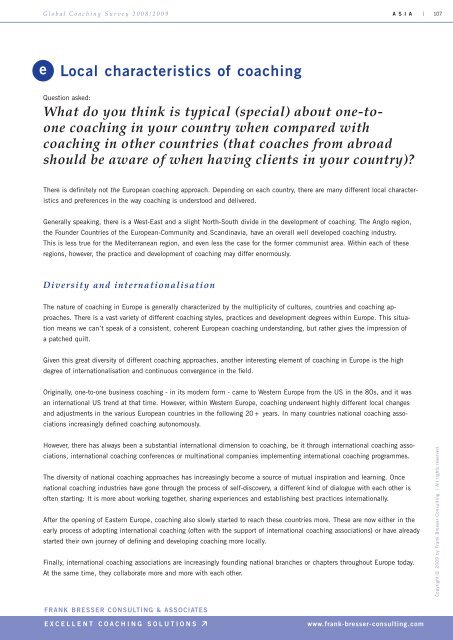Global Coaching Survey - Frank Bresser Consulting
Global Coaching Survey - Frank Bresser Consulting
Global Coaching Survey - Frank Bresser Consulting
Create successful ePaper yourself
Turn your PDF publications into a flip-book with our unique Google optimized e-Paper software.
e<br />
<strong>Global</strong> <strong>Coaching</strong> <strong>Survey</strong> 2008/2009 aSia |<br />
local characteristics of coaching<br />
Question asked:<br />
What do you think is typical (special) about one‑to‑<br />
one coaching in your country when compared with<br />
coaching in other countries (that coaches from abroad<br />
should be aware of when having clients in your country)?<br />
There is definitely not the European coaching approach. Depending on each country, there are many different local characteristics<br />
and preferences in the way coaching is understood and delivered.<br />
Generally speaking, there is a West-East and a slight North-South divide in the development of coaching. The Anglo region,<br />
the Founder Countries of the European-Community and Scandinavia, have an overall well developed coaching industry.<br />
This is less true for the Mediterranean region, and even less the case for the former communist area. Within each of these<br />
regions, however, the practice and development of coaching may differ enormously.<br />
Diversity and internationalisation<br />
The nature of coaching in Europe is generally characterized by the multiplicity of cultures, countries and coaching approaches.<br />
There is a vast variety of different coaching styles, practices and development degrees within Europe. This situation<br />
means we can’t speak of a consistent, coherent European coaching understanding, but rather gives the impression of<br />
a patched quilt.<br />
Given this great diversity of different coaching approaches, another interesting element of coaching in Europe is the high<br />
degree of internationalisation and continuous convergence in the field.<br />
Originally, one-to-one business coaching - in its modern form - came to Western Europe from the US in the 80s, and it was<br />
an international US trend at that time. However, within Western Europe, coaching underwent highly different local changes<br />
and adjustments in the various European countries in the following 20+ years. In many countries national coaching associations<br />
increasingly defined coaching autonomously.<br />
However, there has always been a substantial international dimension to coaching, be it through international coaching associations,<br />
international coaching conferences or multinational companies implementing international coaching programmes.<br />
The diversity of national coaching approaches has increasingly become a source of mutual inspiration and learning. Once<br />
national coaching industries have gone through the process of self-discovery, a different kind of dialogue with each other is<br />
often starting: It is more about working together, sharing experiences and establishing best practices internationally.<br />
After the opening of Eastern Europe, coaching also slowly started to reach these countries more. These are now either in the<br />
early process of adopting international coaching (often with the support of international coaching associations) or have already<br />
started their own journey of defining and developing coaching more locally.<br />
Finally, international coaching associations are increasingly founding national branches or chapters throughout Europe today.<br />
At the same time, they collaborate more and more with each other.<br />
FRank bReSSeR ConSultinG & aSSoCiateS<br />
exCellent CoaCHinG SolutionS<br />
www.frank-bresser-consulting.com<br />
107<br />
Copyright © 2009 by <strong>Frank</strong> <strong>Bresser</strong> <strong>Consulting</strong> | All rights reserved.


